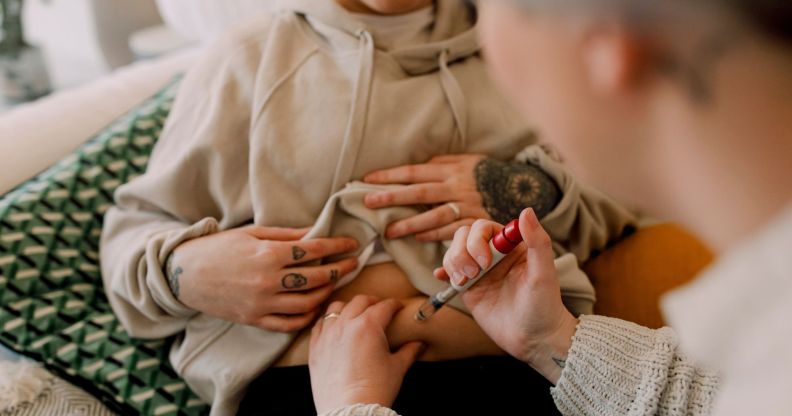Same-sex couples hit with ‘gay tax’ in over 90 per cent of NHS England trusts

Same-sex couples face costs of over £20,000 in order to afford IVF treatment. (Getty)
Same-sex couples are being forced to pay thousands for NHS fertility treatment compared to heterosexual couples, a report has found.
NHS England currently funds in vitro fertilisation (IVF) for heterosexual couples who have tried for a baby for over two years.
But the same treatment isn’t afforded to same-sex couples, who are reportedly expected to demonstrate the need for IVF by spending thousands on between three and 12 rounds of private artificial insemination.
According to a report from the BBC, couples say they have spent upwards of £20,000 on artificial insemination treatment before they can be offered IVF on the NHS.
The disparity, which campaigners are calling a ‘gay tax’, means that couples waiting for a baby could potentially be forced to pay for rounds of private care for months.
After contacting the 42 Integrated Care Boards (ICBs) in England – which can dictate policy decisions about NHS-funded IVF treatment – the BBC found that only four (9.5 per cent) offer fertility treatment to same-sex couples who have not already paid for private artificial insemination treatment.
Over 90 per cent of ICBs expected same-sex couples to pay out privately before they are eligible for help on the NHS.
It also found that some ICBs offered just three attempts at IVF for both heterosexual and same-sex couples, while others could only offer one.
Ten of the ICBs said policy reviews were currently underway to mitigate the financial and emotional impact on same-sex couples.
Dorset couple, Shauna Mansbridge, 30, and Faye Hawkins, 33, told the BBC that their GP said they would only qualify for IVF if they attempted 12 rounds of intrauterine insemination (IUI), costing them at least £30,000.
“It’s the one time in my life I’ve felt discriminated against,” Hawkins said. “I didn’t think it would be by the NHS.”
While IUI and other forms of artificial insemination can be cheaper, they are significantly less effective than IVF.
“There’s all these stages [of treatment] – and you get to one stage and you’re disappointed, you get to another stage, you’re a little bit more disappointed,” Mansbridge said. “You just don’t have control over the outcomes.
“It’s tough on both of us,” she continued.
The two have already spent their life savings – £22,000 – on seeking IVF treatment. Mansbridge shared that the emotional toll of undergoing two private IVF cycles had taken its toll on them.
“We’ve had to make a lot of sacrifices,” she added. “But this is our only route to motherhood.”
How did this story make you feel?

